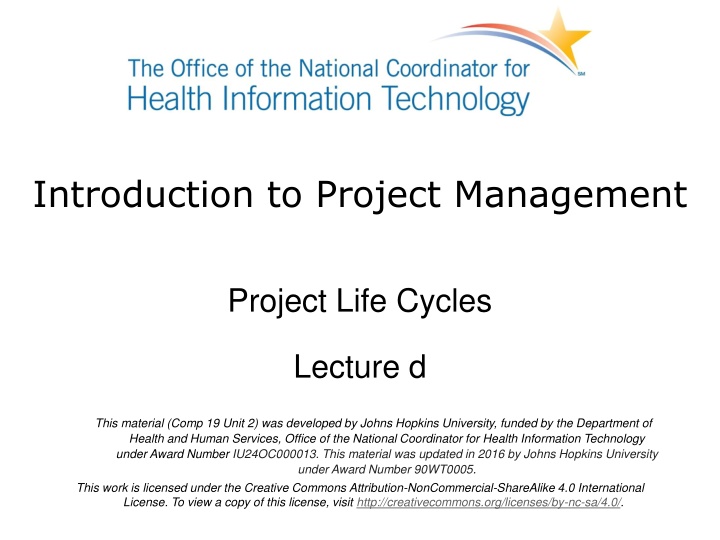
Project Life Cycles in Health IT Management
Explore the intricacies of project life cycles in Health IT management with a focus on deliverables, organizational issues, and key objectives. Learn about different project management approaches and the importance of meeting stakeholder expectations for successful project outcomes.
Download Presentation

Please find below an Image/Link to download the presentation.
The content on the website is provided AS IS for your information and personal use only. It may not be sold, licensed, or shared on other websites without obtaining consent from the author. If you encounter any issues during the download, it is possible that the publisher has removed the file from their server.
You are allowed to download the files provided on this website for personal or commercial use, subject to the condition that they are used lawfully. All files are the property of their respective owners.
The content on the website is provided AS IS for your information and personal use only. It may not be sold, licensed, or shared on other websites without obtaining consent from the author.
E N D
Presentation Transcript
Introduction to Project Management Project Life Cycles Lecture d This material (Comp 19 Unit 2) was developed by Johns Hopkins University, funded by the Department of Health and Human Services, Office of the National Coordinator for Health Information Technology under Award Number IU24OC000013. This material was updated in 2016 by Johns Hopkins University under Award Number 90WT0005. This work is licensed under the Creative Commons Attribution-NonCommercial-ShareAlike 4.0 International License. To view a copy of this license, visit http://creativecommons.org/licenses/by-nc-sa/4.0/.
Project Life Cycles Learning Objectives Lecture d Identify process groups and knowledge areas in project management. Differentiate linear, iterative, adaptive, and agile project life cycles. Relate life cycle phases to reviews, milestones, and deliverables. Compare various organizational structures as contexts for managing projects. 2
Projects Generate Deliverables Every project is undertaken to deliver results, such as a product, system, application, documentation, or the capability to perform a service Deliverables: Are unique and verifiable -- it must be possible to confirm that the deliverables have been generated by the project Must meet expectations of project stakeholders Timeliness and quality of deliverables are key determinants of project success 3
Examples of Deliverables in Health IT Projects New or re-engineered systems, e.g., Electronic Health Record (EHR) implementation Radiological imaging Provider order entry Patient billing EHR - enabled processes, e.g., Emergency room admission processing Outpatient service delivery Prescription fulfillment Web-based employee time reporting 4
Organizational Issues in Project Management Customers may be --- Internal: respect role of customer even when part of your organization External: clarify your reporting roles to your senior management and your customer Project team members from multiple organizations Multiple lines of authority and responsibility Differences in organizational style, standards and practices+ IT systems development trends present challenges and opportunities for effective project management: Virtual teams of multiple organizations, with partner, contractor- subcontractor, and sourcing relationships Global system development teams 5
Organizational Context for Project Management Project managers must consider the effects of various organizational structures on project funding, senior management reporting, and project staffing: Functional organization: projects operate within a single functional unit or across multiple units Matrix organization: project staff have dual loyalties, to the project and their functional unit Project-based organization: work gets done directly through project managers 6
Project Management in a Functional Organization Team members from multiple functional units can be a challenge: Need PM s functional manager to work with peer functional managers to get team members time and commitment 7
Project Management in a Matrix Organization Organization has both functional and program managers Program manager directs PMs 8
Project Management in a Project-Based Organization Courtesy of: Theron Feist Work gets done through projects Example: Each program is a set of projects with same external client sponsor 9
Project Life Cycles Summary Lecture d We reviewed process groups and knowledge areas in project management. We reviewed the four different types of project life cycles. We have also discussed how life cycle phases can be used to address reviews, milestones, and deliverables. We have compared different organizational structures as contexts for managing projects 10
Project Life Cycles References Lecture d References Highsmith, JA. (2009) Agile Project Management: creating innovative products. 2nd ed; Boston: Pearson Education. Houston S, Bove LA. (2010) Project Management for Healthcare Informatics. New York: Springer Science + Business Media, LLC. Kerzner H. (2009) Project Management: a Systems Approach to Planning, Scheduling, and Controlling. 10th ed. Hoboken, NJ.:Wiley. Project Management Institute, A Guide to the Project Management Body of Knowledge. 4th ed (2008).Newtown Square, PA: PMI. Whitten N. Neal (2007).Whitten's Let's Talk! More No-nonsense Advice for Project Success. Vienna, VA.:Management Concepts Inc. Wysocki, RK .(2009).Effective Project Management: traditional, agile, extreme. 5th Edition. New York: Wiley. Images Slide 7: Project Management in a Project-Based Organization. Image courtesy Johns Hopkins University School of Nursing Slide 8: Project Management in a Matrix Organization. Image courtesy Johns Hopkins University School of Nursing Slide 9: Project Management in a Project-Based Organizaiton. Courtesy of: Theron Feist 11
Introduction to Project Management Project Life Cycles Lecture d This material (Comp 19 Unit 2) was developed by Johns Hopkins University, funded by the Department of Health and Human Services, Office of the National Coordinator for Health Information Technology under Award Number IU24OC000013. This material was updated in 2016 by Johns Hopkins University under Award Number 90WT0005. 12






















